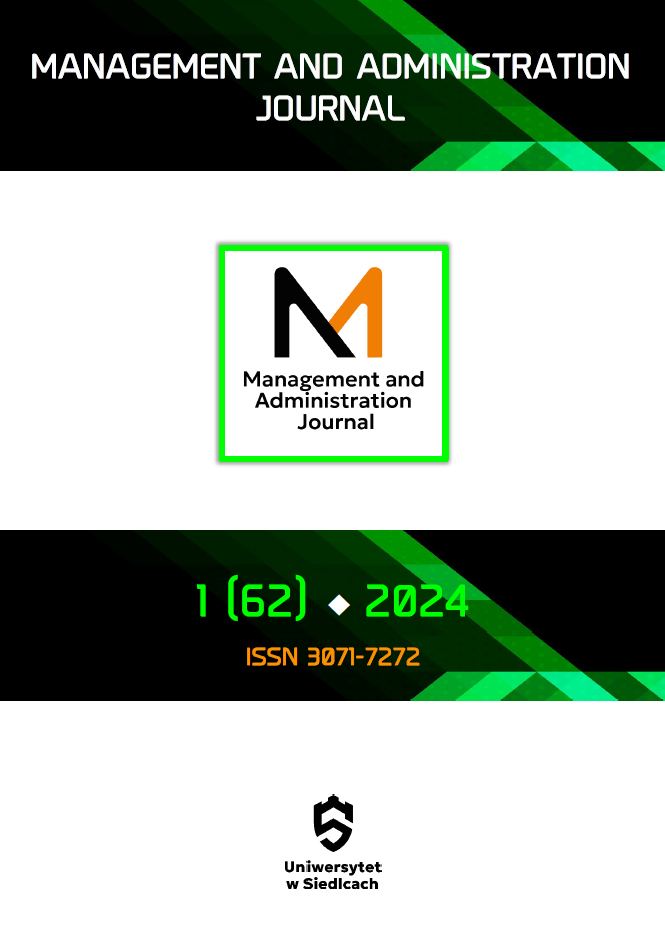COUNTERTYPE OF ACCEPTABLE RISK IN CONDUCTING A BUSINESS ACTIVITY
DOI:
https://doi.org/10.34739/maj.2024.01.08Keywords:
economic risk, orgnization management, due diligence, economic environmentAbstract
The purpose of this article was to present and discuss the issue of economic risk in the context of due diligence of people managing an organisation. A special role in the study is devoted to presenting the type and nature of the risks taken from the perspective of the functioning of enterprises in changing environmental conditions. The article discusses the essence and interpretation of the concept of ‘due diligence’ resulting from the professional nature and legal form of the business. The main goal of the submitted article was to answer the following research question: What actions of the people managing the organisation fall within the limits of permissible economic risk and what types of risks occurred in connection with the emergence of the COVID-19 pandemic. the risks resulting from the pandemic in the first year of its duration were characterised on the analysis of the financial statements of companies listed on the Stock Exchange with mWIG40. The admissibility limits of activities related to economic risk were assessed in the context of current achievements of jurisprudence and economic practice. The following study is of an interdisciplinary nature. The article attempts to formulate a countertype of permissible risk in business activity while presenting the types of risk that may appear in connection with random events.
Downloads
References
Długosz, S., Laszuk, G. (1999). Ryzyko gospodarcze związane z działalnością handlową. [Economic risks associated with commercial activities], Warszawa: Wyd. INFOR.
Fanning, P. (2007). Management of Risk Guidance for Practitioners. [Wytyczne dotyczące zarządzania ryzykiem dla praktyków], UK: OGC.
GUS, 2023, Pojęcia stosowane w statystyce publicznej. [Concepts used in public statistics]. https://stat.gov.pl/metainforma-cje/slownikpojec/pojecia-stosowane-w-statystyce-publicznej/1515,pojecie.html#:~:text=Indeks%20mWIG40%20jest%20in-deksem%20cenowym,wynosi%C5%82%201000%20punkt%C3%B3w.
Kaźmierczyk, A., Franczak, A. (eds.). (2019). Prawo podatkowe w systemie prawa. Międzygałęziowe związki norm i instytucji prawnych. [Tax law in the system of law. The interrelationship of legal norms and institutions], Warszawa: Wolters Kluwer Business.
Konstytucja Rzeczpospolitej Polskiej z dnia 2 kwietnia 1997 roku [Act of April 2, 1997. Constitution of Republic of Poland], Dz.U. 1997 nr 78, poz. 483.
Krajowy Rejestr Długów (2020). KoronaBilans MŚP. [Covid balance sheet of small medium-sized enterprises], Warszawa.
Machała, R. (2014). Zarządzanie finansami i wycena firmy. [Financial management and enterprise value], Wrocław: UNIMEX,
MSSF 7 (2008). Instrumenty finansowe- ujawnianie informacji. [Financial instruments -Disclosure of information], Dziennik Urzędowy Unii Europejskiej, L 320/417, 29.11.2008 [Official Journal UE, L 320/417].
Narkiewicz, J. (2011). Syntetyczna ocena ryzyka działalności przedsiębiorstwa na podstawie sprawozdań finansowych. [Synthetic risk assessment of the company’s operations based on financial statements], Nauki o Finansach 3 (8), p. 61.
Raport roczny Spółki BIT 11 (2021). [Annual Report of the Company BIT 11]. https://ir.11bitstudios.com/wp-content/uplo-ads/2023/03/Raport-roczny-11-bit-studios-S.A.-za-2021-rok.pdf.
Rutkowska-Brdulak, A. (2018). Stałe miejsce prowadzenia działalności w VAT a podmiotowość prawno podatkowa. Dylematy, konsekwencje, ryzyka. [Fixed place of business in VAT and legal and tax subjectivity. Dilemmas, consequences, risks], Warszawa: Wolters Kluwer Business.
Skrzypek, E., Grela, G., Piasecka, A. (2019). Uwarunkowania doskonalenia zrządzania jakością. [Determinants of quality management improvement], Lublin: Wyd. Uniwersytetu Marii Curie Skłodowskiej w Lublinie.
Stabryła, A., Wawak, S. (2012). Metody badania i modele rozwoju organizacji. [Methods of research and models of organisation development]. Kraków: Wyd. Fundacja Uniwersytetu Ekonomicznego w Krakowie.
Szopa, A. (2012). Podstawy inżynierii finansowej. [Basics of financial engineering]. Warszawa: Wolters Kluwer Business.
Thlon, M. (2013). Charakterystyka i klasyfikacja ryzyka w działalności gospodarczej. [Characteristics and classification of risk in business activities], Zeszyty Naukowe Ekonomia 902, p. 17-36.
Uchwała Sądu Najwyższego z dnia 18 czerwca 1991 roku, sygn. akt. III CZP 40/91, publ. Baza Orzeczeń Sądu Najwyższego.
Uchwała Sądu Najwyższego z dnia 23 lutego 2000 roku, sygn. akt. III CZP 88/04. [Resolution of the Supreme Court of February 23, 2000]. publ. Baza Orzeczeń Sądu Najwyższego.
Uchwała Sądu Najwyższego z dnia 6 grudnia 1991 roku, sygn. akt. III CZP 117/91. [Resolution of the Supreme Court of December 6, 1991]. publ. Baza Orzeczeń Sądu Najwyższego.
Wolański, R. (2013). Wpływ otoczenia finansowego na konkurencyjność małych i średnich przedsiębiorstw. [Impact of the financial environment on the competitiveness of small and medium-sized enterprises], Warszawa: Wolters Kluwer Business.
Wyrok Sądu Apelacyjnego we Wrocławiu z dnia 17 kwietnia 2019 roku. [Judgment of the Court of Appeals in Wroclaw dated April 17, 2019].
Wyrok Sądu Apelacyjnego we Wrocławiu z dnia 17 kwietnia 2019 roku. [Judgment of the Court of Appeals in Wroclaw dated April 17, 2019]. sygn. akt. II AKa 407/18 publ. Portal Orzeczeń Sądów Powszechnych.
Zapała, S., Kaźmierczak, M. (2011). Ryzyko, ciągłość biznesu, odpowiedzialność społeczna. Nowoczesne koncepcje zarządzania. [Risk, business continuity, social responsibility. Modern management concepts]. Warszawa: Wolters Kluwer Business.
Downloads
Published
Issue
Section
License
Copyright (c) 2024 Management and Administration Journal

This work is licensed under a Creative Commons Attribution-NonCommercial-NoDerivatives 4.0 International License.





